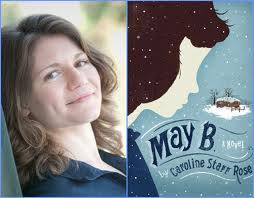Debut Novelist Prunes her Rosebush
Introduced first in 2007, debut children’s authors have formed a cooperative effort to market their books. I featured Revision Stories from the Classes of 2k8, 2k9, 2k11 and this year, the feature returns for the Class of 2k12.
Guest post by Caroline Starr Rose, author of MAY B., MG, January 2012

My first-round edits arrived with a four-page letter attached. In it my editor praised my writing (“This story is like a prize rosebush that needs just a bit of pruning!”) and pointed to some “thorns” that needed work. (From Darcy: Ha! Notice Caroline’s last name.)
- More external conflict to go with all the internal business
MAY B. takes place on the 1870s Kansas frontier. Throughout much of the story, my protagonist fights to survive a blizzard. Nice external conflict, right? But much of the story is internal. There’s little dialogue, for one thing; May spends most of the story alone. She wrestles with memories of her inadequacy in school, and in her abandonment goes through stages of confusion, anger, fear and despair. But without some other tangible challenge, the story was lacking. My editor gave me a few ideas, and I latched onto one: a wolf that could terrify, challenge, and ultimately mirror my protagonist’s struggles. - Whiny protagonist — don’t let your audience lose compassion!
I find it hard to stick with a book with a whiny character. To learn that May sometimes slipped into overkill was exactly what I didn’t want and exactly what the story didn’t need. As MAY B. is divided into three sections, my editor suggested I let May get her complaints out in the first two parts, but the third needed to be about growth, resolve, and moving forward. This advice provided a good way for me to watch my character’s progression and to temper her outbursts. Once May’s taken charge of her situation, there could be moments of doubt, but she couldn’t fall back into old behaviors. She had to push ahead. - Ending = Deus Ex Machina
For those of you unfamiliar with this term, here’s the definition:- (in ancient Greek and Roman drama) a god introduced into a play to resolve the entanglements of the plot.
- any artificial or improbable device resolving the difficulties of a plot.
My original ending was contrived. It just didn’t work. In order to change this, I had to weave bits into the beginning of the story to make the ending more plausible, and I had to be okay with leaving the outcome/redemption of one character, Mr. Oblinger, open ended. This was hard, as I really believed in his motives (even if they didn’t play out as he anticipated), but in keeping with an ending that wasn’t “artificial or improbable”, there was no room for this.
Tying the Revision Process Together
Throughout the revision process, my editor offered the perfect combination of praise and challenge. When she’d ask for something particularly difficult, she’d follow up the request with “I know you can do this!” Her belief in my ability freed me up to approach my work with confidence. Revising with someone who believed in my character gave me the courage to examine my story critically and to fearlessly change parts that weren’t working.
Love the Rosebush analogy. That’s a great story about how May B. came together.
Interesting comments about the whiny character. It’s tough to deal with a flawed main character in harsh circumstances but still have that character be appealing.